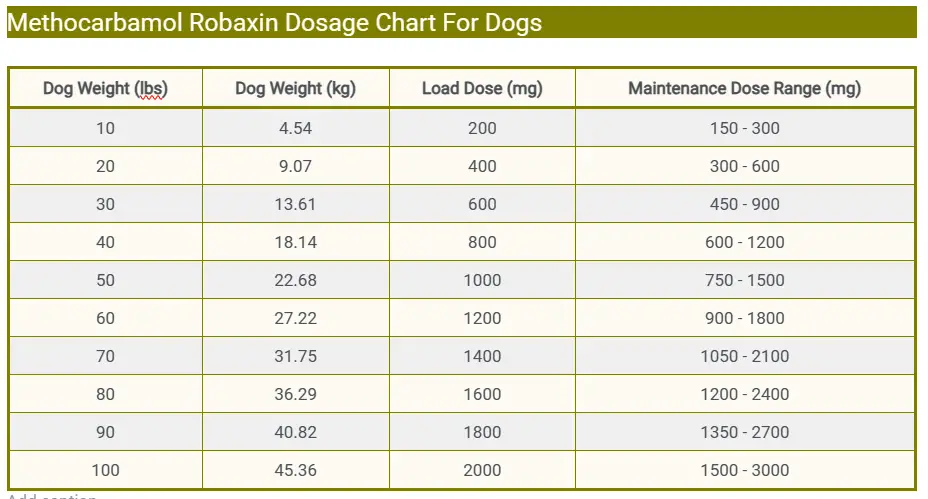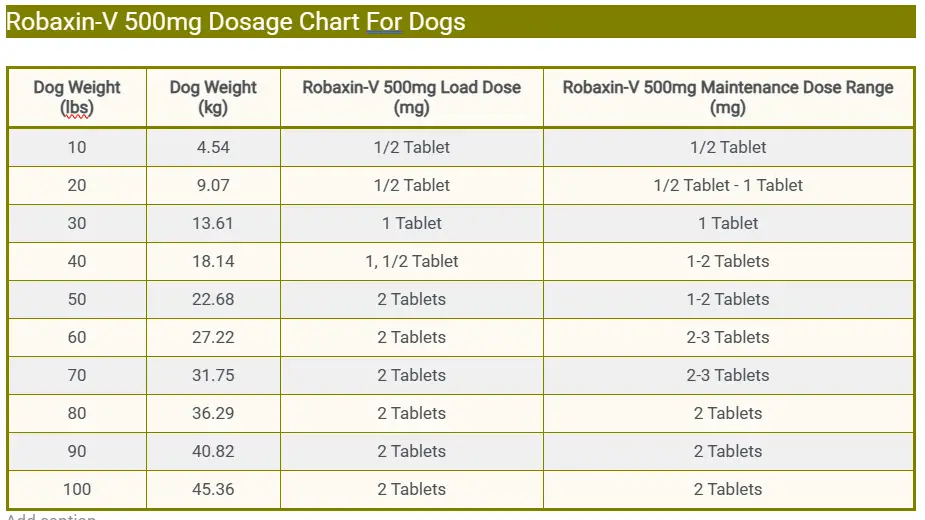The recommended dosage regimen for Methocarbamol (ROBAXIN) in dogs involves a load dose administered on the first day, calculated at 20 mg per pound (40 mg per kilogram) of the dog’s weight. Following this initial dose, a maintenance dose is advised for the second day, ranging between 10 to 20 mg/lbs (15 to 40 mg/kg) of the dog’s weight.
Methocarbamol Robaxin Dosage For Dogs

-
Ideal Dose: 60 mg per pound (130 mg per kilogram) of the dog’s weight.
-
Uses: Muscle relaxant
-
FDA Approved: Yes
-
Variants: Injectable, Tablets
-
Storage & Handling: Room Temperature
-
Administration: T.I.D
Disclaimer: Self-medication can be hazardous. Please consult your veterinarian for personalized guidance on the appropriate dosage for your furry friend’s specific condition.
Methocarbamol, commonly known by its brand name Robaxin, as a medication for dogs necessitates a comprehensive understanding of its dosage regimen.
Methocarbamol serves as a muscle relaxant, frequently prescribed by veterinarians to alleviate muscle spasms and discomfort in canines.
However, ensuring the appropriate dosage is crucial for the safety and efficacy of the treatment.
In this blog post, we delve into the intricacies of Methocarbamol dosage for dogs, exploring the recommended dosing guidelines and essential considerations to ensure the well-being of our canine companions.
Robaxin Dosage For Dogs
Methocarbamol is a potent skeletal muscle relaxant that acts selectively on the central nervous system, mainly targeting the internuncial neurons of the spinal cord.
This targeted action reduces skeletal muscle hyperactivity without affecting normal muscle tone. It is long-acting, essentially non-toxic, and has demonstrated effectiveness in treating various disorders characterized by acute muscle spasms.
Robaxin Dosage for dogs can vary depending on the dog’s size, health status, and the reason for prescribing the medication.
Usually, meloxicam ROBAXIN is prescribed for dogs at a dosage of 20 mg per pound (40 mg per kilogram) of the dog’s weight. Following this initial dose, a maintenance dose is advised for the second day, ranging between 10 to 20 mg/lbs (15 to 40 mg/kg).
It is important to divide the total prescribed dose evenly into two or three equal portions, to be given to the dog at intervals of twelve or eight hours respectively.
It’s essential to consult a veterinarian first before administering human medications to dogs, as dosages and formulations can be significantly different and may pose risks to your pet’s health. Additionally, NSAIDs like meloxicam can have potential side effects, so it’s crucial to use them under veterinary supervision and follow the prescribed dosage regimen precisely.
Methocarbamol Robaxin Dosage Chart For Dogs
| Dog Weight (lbs) | Dog Weight (kg) | Load Dose (mg) | Maintenance Dose Range (mg) |
|---|---|---|---|
| 10 | 4.54 | 200 | 150 – 300 |
| 20 | 9.07 | 400 | 300 – 600 |
| 30 | 13.61 | 600 | 450 – 900 |
| 40 | 18.14 | 800 | 600 – 1200 |
| 50 | 22.68 | 1000 | 750 – 1500 |
| 60 | 27.22 | 1200 | 900 – 1800 |
| 70 | 31.75 | 1400 | 1050 – 2100 |
| 80 | 36.29 | 1600 | 1200 – 2400 |
| 90 | 40.82 | 1800 | 1350 – 2700 |
| 100 | 45.36 | 2000 | 1500 – 3000 |
Robaxin-V 500mg Dosage Chart For Dogs
| Dog Weight (lbs) | Dog Weight (kg) | Robaxin-V 500mg Load Dose (mg) | Robaxin-V 500mg Maintenance Dose Range (mg) |
|---|---|---|---|
| 10 | 4.54 | 1/2 Tablet | 1/2 Tablet |
| 20 | 9.07 | 1/2 Tablet | 1/2 Tablet – 1 Tablet |
| 30 | 13.61 | 1 Tablet | 1 Tablet |
| 40 | 18.14 | 1, 1/2 Tablet | 1-2 Tablets |
| 50 | 22.68 | 2 Tablets | 1-2 Tablets |
| 60 | 27.22 | 2 Tablets | 2-3 Tablets |
| 70 | 31.75 | 2 Tablets | 2-3 Tablets |
| 80 | 36.29 | 2 Tablets | 2 Tablets |
| 90 | 40.82 | 2 Tablets | 2 Tablets |
| 100 | 45.36 | 2 Tablets | 2 Tablets |
Related Post: Vitamin E Dosage For Dogs
Uses
-
Muscle Spasms: Methocarbamol can be prescribed to dogs experiencing muscle spasms or cramps due to various reasons such as injury, overexertion, or neurological issues.
-
Muscle Strain or Injury: In cases where dogs have suffered from muscle strain or injury, methocarbamol can help relieve pain and discomfort by relaxing the affected muscles.
-
Orthopedic Conditions: Dogs with orthopedic conditions like intervertebral disc disease (IVDD) or degenerative joint disease (osteoarthritis) may benefit from methocarbamol to reduce muscle spasms and associated pain.
-
Post-Surgical Care: Methocarbamol may also be prescribed post-surgery to help manage muscle pain and tension, especially after orthopedic procedures or surgeries involving muscles.
-
Restlessness or Anxiety: Sometimes, dogs may exhibit restlessness or anxiety due to muscle discomfort or tension. Methocarbamol can help alleviate these symptoms by promoting muscle relaxation.
Related Post: Safe-Guard® Dosage For Dogs
Potential Side Effects
-
Drowsiness
-
Gastrointestinal upset (nausea, vomiting, diarrhea)
-
Hypersalivation
-
Allergic reactions (itching, hives, swelling, difficulty breathing)
-
Decreased blood pressure
-
Liver or kidney effects (jaundice, changes in urination)
-
Central nervous system effects (disorientation, confusion, tremors)
-
Hematologic effects (anemia, leukopenia)
Which Dogs Should Not Take Methocarbamol Robaxin
Canines with the following health issues should not take Methocarbamol Robaxin without veterinary recommendations.
-
Dogs with known hypersensitivity or allergy to methocarbamol
-
Dogs with severe liver disease
-
Dogs with severe kidney disease
-
Pregnant or nursing dogs
-
Dogs taking medications that may interact adversely with methocarbamol





![Can Dogs Eat Blood? 7 Side Effects [Expert Opinion]](https://petskor.com/wp-content/uploads/2022/04/Webp.net-resizeimage-12.jpg)
